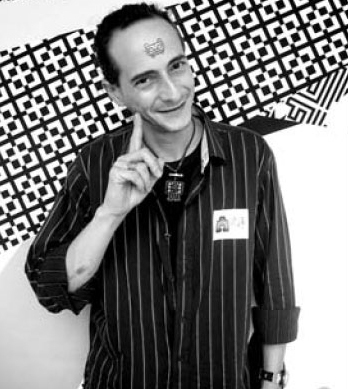|

Having lived in China for 13 years, Ma Ti says he has now emigrated to the country. He even forsook his original Swiss name and is known only by his Chinese name Ma Ti, which means "horse's hoof".
|
Having lived in China for 13 years, Ma Ti says he has now emigrated to the country. He even forsook his original Swiss name and is known only by his Chinese name Ma Ti, which means "horse's hoof".
Ma gave himself the name because he was born in the year of horse, and he walks fast.
A typical day for Ma begins when he wakes up to the chirping of birds on Yuelu Mountain where he lives. After hanging around his home and having lunch, he spends the mid-afternoon and evening working and playing at Ma Ti's Campus Lounge, the live music house he manages. In a city where the nightlife is "mostly KTVs and identical bars side by side competing without originality but with Austrian football TV", Ma's place is unique in that it offers local musicians and students a place to play.
A glass of juice starts at 3 yuan and a beer at 6 yuan, as Ma wants to keep the prices low so as to "serve the people".
In order to entice people from KTV to live music, multi-instrumentalist Ma has formed a band with some buskers he discovered and they provide a live accompaniment for customers singing Chinese pop songs .
He will sometimes play in the lounge till dawn, and when he leaves he'll wait for a bus by the Xiangjiang River, which, cast in mist, reminds him of the lakes in Switzerland.
Although he sometimes misses skiing down Swiss mountains, he says he has had enough of the cold weather there, which is why he has always lived in South China since he arrived in 1997. At that time he worked as a English teacher in Yangshuo, Guangxi Zhuang Autonomous Region. Then he moved to Guangzhou to become a producer with Crazy English - its slogan 'To shout out loud, you learn' - and a member of well-known rock musician Wang Lei's band.
He also lived in Chengdu, Sichuan, and Shiyan, Hubei, before moving to Changsha in February this year. "I like hot weather because it brings people out more," he says.
Ma sees the relatively small number of foreigners in Changsha as an advantage, since this gives him the chance to be the first foreigner to shake hands and joke with the local people.
Although he is often stared at when he walks in the street, it is not something that bothers him. "It's because I live in a place where people seldom see or meet foreigners, and I'm very handsome too," he says.
Nor does he mind if people start random conversations with him, something that happens about 20 times every day.
Ma first visited Changsha in 1999, and has since been waiting for an opportunity to stay for a longer period, as he likes the simple lifestyle, the fresh food, direct access to the countryside, and "its efforts to transform itself into a vibrant, creative, 21st-century-oriented hub for south central China's youth".
Changsha has a strong academic tradition, represented by the famous Yuelu Academy, which is more than 1,000 years old.
In the university area where Ma's live house is located, there are some 80,000 students and numerous new dormitory buildings, and every day Ma sees studious young people from different parts of Hunan. He was also invited to be a consultant at the Hunan University's School of Design, where he gives advice to students on using music in their video projects.
After work, Ma enjoys hanging out with local friends, where they generally "eat, eat and eat, and then eat some more just to make sure".
Ma still remembers the cold war propaganda about China when he served in the Swiss army in the 1980s. He came to see China for himself, and he has stayed ever since, and now has no plan to go back to Switzerland.
(China Daily June 1, 2010)